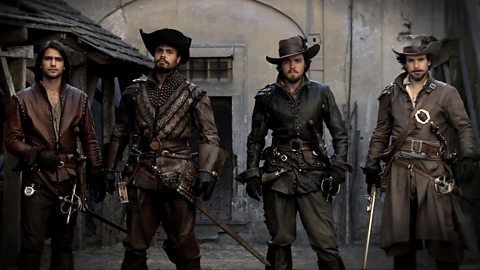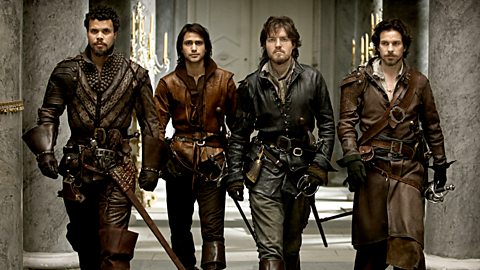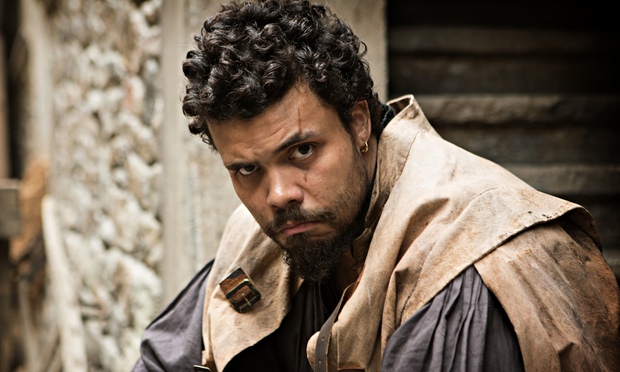I'd suspected that like many English language productions based on the Dumas père's novel this one too would be bombast that had no part in the author's buoyant ripostes, and filled with physical gags grounded in contemporary pop culture references. Worse, it would be non-stop frantic action sequences, particularly at the beginning -- chasing each other through Paris, with many interrupted duels, as we learn who the Three are and who D'Artagnan is, and how they overcome their differences to become the Four.
The first episode fulfilled none of my suspicions. It was buoyant, with more darkness and depth of situations than is usually provided in English language productions of The Three Musketeers, in which scenes are played for laughs. It looked good, shot in Prague, standing in for 17th century Paris, in the Czech Republic. However, this means that the glorious spaces of palaces and halls are non-realistically empty and unfurnished for the historical court of Louis XIII, It's also so cold that the actors' breath vapor is captured onscreen, even in indoor scenes within these palace rooms. But, after watching four episodes, this is the only criticism I can make, and it's so mild as to be mentioned only to observe I noticed.
The costumes were fairly period. Best of all, in this first episode the weight and stiffness are palpable of that "dashing" cavalier musketeer leather, whether as jackboots, coats -- meaning the outer garment worn by the fellow in the back of the top photo, or on our far right in the second photo above -- whatever is the correct term for that outer coat -- jaquette? that can't be right -- riding gauntlets, sword scabbards, weapons and horse tack.
The actors, male and female, are as pleasing to the eye as are the horses, so there's that as well. The horses are heavy, bred for military action.
On the other end of the spectrum King Louis XIII is more pleasing to the eye than he ever was in life, with his double row of front teeth, protruding tongue, speech impediment and so on. The way the actor, Ryan Gage, plays the speech impediment and stammer on screen is by suggestion: a stop in his speech, as if he's considering what he's going to say, followed by a faint flicker of uncertainty around his mouth, a tilt and tightening of his neck. These faint facial expressions -- which are not in every scene, so they don't make the King look predictably foolish (and Louis was perhaps too dependent on others, but he wasn't a weakling or a fool -- add surprising dimension to King Louis's portrayal. We like looking at him, because he's interesting, He carries himself like a French king of the 17th century, but he's not a featureless piece of wood who must roar and stomp -- or be a foolish weakling -- in order to convey he's human, though 100% royal.
Moreover, for me, having some historical knowledge of Louis XIII and his reign, knowing why he might be writing letters to the Spanish king -- and indeed who the Spanish king was, and that the Hapsburg emperor was also Spanish, meaning France is surrounded by Spain -- has added a whole other level to entertainment I am getting from this series. This production doesn't seem afraid of history, and I much appreciate that.
The BBC currently is in the process of running the second series of The Musketeers, though without Peter Capaldi as Cardinal Richelieu, due to prior commitments to Dr. Who (of Hoo I've never watched a single episode of any series. It's been on, like, what? since before I was born?).
The Musketeers finds its stride in the third episode.
Until the third episode, nothing whatever was made of Porthos as a man of color, played by Howard Charles. This is very cool, I thought, with the history of people of color in France in general, in the arts and the military particularly, and most of all, the history of Alexander Dumas's father. This is a television entertainment set in 17th France, that acknowledges there were people of color with agency in France (until Napoleón changed that, including breaking down Alexander Dumas's father, a general in la Grande Armée, due to his racism, shared with his Empress Josephine, from slaveholding Martinique.), But, gradually over the course of the third episode it gets even better than.that. The first hint is the episode's title, "Commodities."
The musketeers are tasked by the King with the protection of merchant adventurer, Bonnaire. He turns out to be a semi-sympathetic con man, who is cheating everyone he has anything to do with. About half way through comes the reveal that centers around Porthos, and which will not be spoiled here. But suffice it to say that every aspect of this reveal is based in historical fact. But it gets better than that too -- there are arguments and discussions among the musketeers and Bonnaire as to morality of the reveal and what it means in terms of musketeer loyalty, national wealth and trade. This isn't something one sees on television much, and not in an action adventure series that still manages to keep a certain lightness of touch.
And then, in terms of the writing, we have a second big reveal, and this is about Athos. These two different reveals both work within a single episode of an action-adventure structure.
I sweep my chapeau from my head in acknowledgment to how good these writers are.
 |
| Constance Bonscieux, D'Artagnon's landlady, who is interestied in guns and swords as a way to add a little more spark to her life beyond housekeeping and being shop assistant to her husband. |
 |
| Queen Anne (of Austria) also wishes for more to her role as a woman and queen than standing around as a symbol of the king . |
 |
| Milady is perfectly cast and played. |
 |
| Queen Anne, Louis's sister, the Duchess of Savoy, and her son, Louis's nephew (who, speaking historically, at this time is Louis's only heir). |
The music score for the opening credits music promises action, historical-adventure and some darkness. The series follows through.






2 comments:
That I know the enmity between Spanish-born Queen Anne of Austria (as she's identified) and Cardinal Richelieu is because she's Spanish and the Cardinal is intensely anti-Spain, makes all this much more fun. For royal women in history, these divided loyalties between their birth families and the families into which they are married for political reasons, appears to be playing out accurately in this series.
I also enjoy knowing, that after a long barren period in her and Louis's marriage, she produced God's Gift, King Louis XIV, and another son after him.
Dumas's knowledge of the history of the Musketeers' eras is detailed, and yet it dances without strain, throughout the thousands of pages that make up their saga.
Love, C.
This is the era in which Spain is starting its long slide from greatest European and imperial power to a poor #4 (1 -2 Spain and / or the Habsburg empire, being one and the same for so long; France; England. That it stays #4 is due entirely to its vast South American colonies. These circumstances were an inspired choice for the Godfather of historical fiction.
Love, C.
Post a Comment